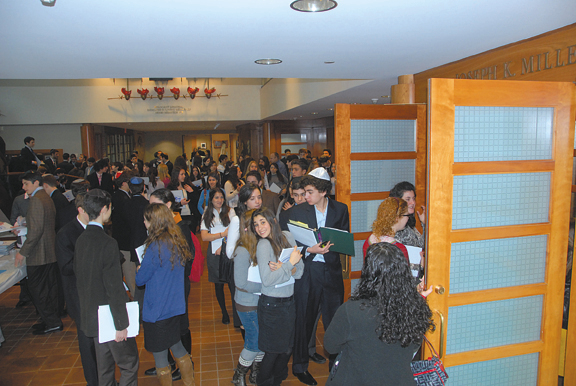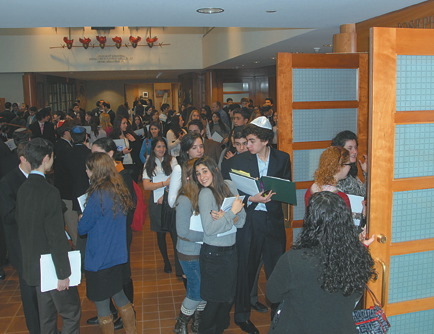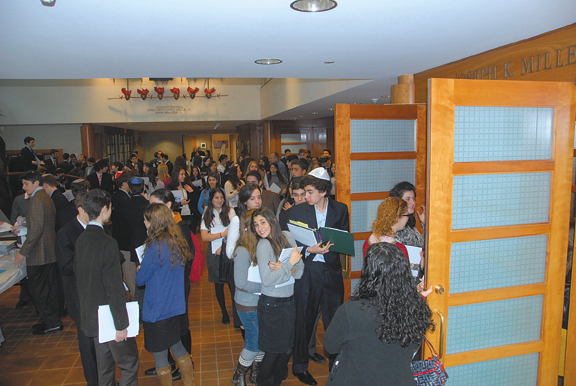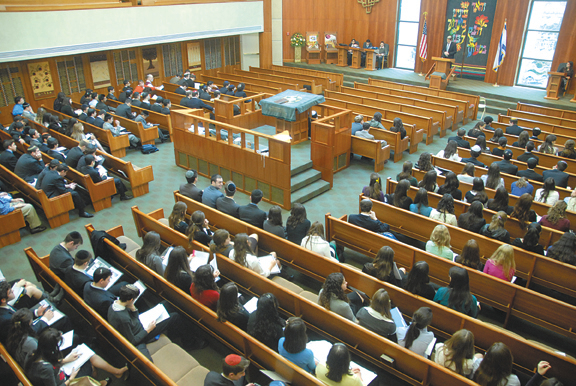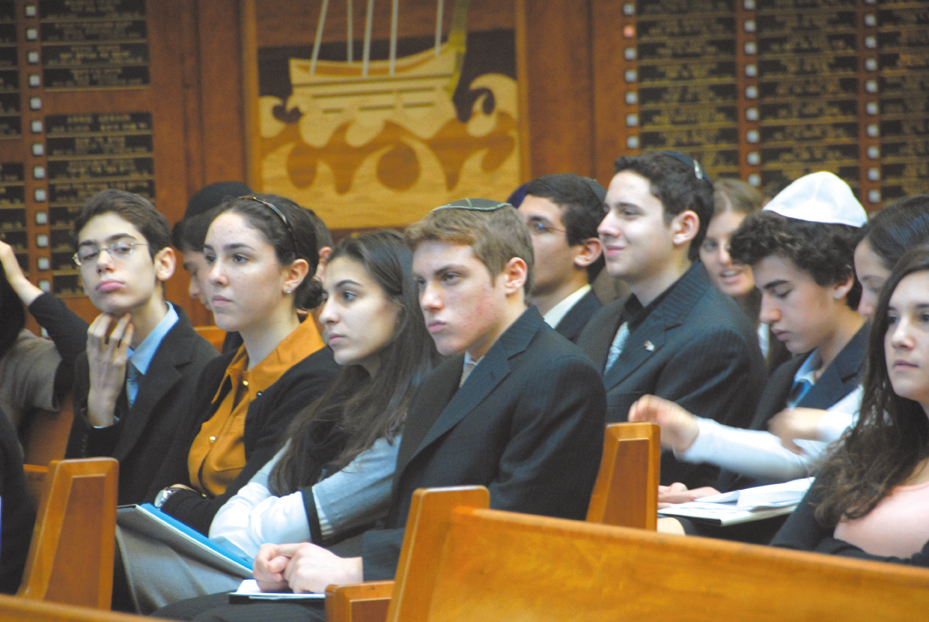Playing politics, HAFTR hosts Model UN conference
By Yaffi Spodek
Issue of Dec. 19, 2008 / 22 Kislev 5769
The Young Israel of Woodmere welcomed a large group of foreign visitors on Dec. 10, when HAFTR hosted its second annual Model United Nations conference there. Close to 250 student delegates representing various countries attended, hailing from 10 yeshiva high schools, including DRS, HANC, Shalhevet and SKA.
In a simulation of the real United Nations, each participant was assigned to represent a specific country and committee and their goal was to collaborate with fellow delegates to devise solutions for the various issues raised by committee members.
“The students don’t know where half these places in the world are, so Model UN gives them the chance to learn about the countries and role play as a delegate from that particular country,” said Joseph Gross, HAFTR’s Model UN advisor, and the event organizer. “The kids were able to talk about the world’s problems and speak about them in each committee.”
HAFTR senior Jennifer Graber served as the UN Secretary General to lead the proceedings.
“I was always interested in politics and government, and this was a good opportunity to really learn how everything works,” she explained.
“It’s cool to learn about the United Nations,” added Gavriella Pearl, a freshman at Shalhevet.
Pearl was representing the Czech Republic, while her classmate, Aliza Tessler, was a delegate of Saudi Arabia. Both were members of the World Meteorological Organization (WMO).
In an effort to research her country as thoroughly as possible, Pearl contacted Martin Palous, the ambassador to the permanent representative of the Czech Republic to the UN. Though Palous was unavailable for a meeting, Pearl spoke to his assistant, Lenka Bouckova, to gain a clearer picture of the problems affecting the Czech Republic.
“I just wanted to find out what my country’s particular needs were,” Pearl told The Jewish Star. “Prague has had very serious floods, and as a member of the WMO, I wanted to research the issues involved.”
Rabbi Yotav Eliach, HAFTR’s principal, spoke to the students, highlighting the significance of the UN as an international mediator, and the history behind its creation.
“The UN allows countries that are absolute enemies to meet... and warring states can talk to each other,” he said. “Member states get together to solve the world’s problems.”
Graber then opened the assembly by introducing guest speaker Elyasaf Schwartz, who serves as an advisor to the permanent mission of Israel to the UN, for the Department of Economic and Social Affairs. He addressed the delegates, giving a general overview on how the United Nations functions and speaking specifically about Israel’s role as a member of the UN.
“Shortly after Israel was voted in as a member state, it began to see a number of permanent anti-Israel measures being installed at the UN,” Schwartz said, referencing the formation of the Committee for the Exercise of the Inalienable Rights of the Palestinian People and other similar groups.
He pointed out that Israel was not granted permanent membership into an official UN group until 2004, when it gained acceptance into WEOG — the Western European and Others Group. Prior to that time, the Arab countries forbade Israel entry into a regional group, which made Israel ineligible to be nominated for many UN committees, including the Security Council.
“The bias of the situation is obvious to all,” Schwartz said, describing Israel’s relationship with the UN as “tumultuous.”
“It appears as if Israel faces interminable discrimination and that its relationship with the UN is beyond repair,” he continued. “However, I believe the opposite is true.”
Despite its tenuous affiliation with the UN, Schwartz emphasized that Israel has contributed significantly to the world community. In last year’s general assembly, Israel successfully initiated a resolution entitled “Agricultural Technology for Development.” Though all the Arab countries abstained, every other country voted in favor of the resolution.
Schwartz also said that, though it is a slow process, “there are a lot of positive developments in terms of Israel’s relationship with the UN,” noting that Israel is serving as the chair of WEOG this month. Reflecting on the UN in general, and its impact on world affairs, he adopted a more positive attitude.
“Noone can contest the unique role the UN serves in combating poverty and hunger,” Schwartz asserted. “One of the most important lessons I’ve learned working at the UN is not to view the UN as a monolithic entity.”
Following his remarks, delegates divided into their respective committee groups. The nine committees included the World Health Organization (WHO); UN Children’s Fund (UNICEF); International Court of Justice (ICJ); World Food Program (WFP); and the UN High Commission on Refugees (UNHCR), among others.
Each committee met separately during two sessions, with a lunch break in between. Delegates were challenged by one topic in each session, and worked together with members of different countries and schools to create a solution. Each meeting was led by a HAFTR student acting as chairperson to moderate the discussions.
The WHO collaborated over the issue of countries suffering from acute or chronic malnutrition, and also attempted to design a plan to combat childhood obesity. The ICJ worked to adopt a resolution specifying where a person is tried if he commits a crime in a foreign country. They also discussed ways to prevent crimes against humanity in countries such as Georgia.
After the second session, all participants reconvened for mincha, following by the closing ceremony in which each delegate received a certificate. Nine students were recognized by the chairpeople as being the “best speaker” on their respective committees, and were awarded with gavels as a prize.
“They were very happy and all the kids had a great time,” said Gross, reflecting on the success of the event.
Gross explained that HAFTR hosted the event to allow local yeshivas to participate in a one-day program and bring a larger group of students along, in comparison to the annual Yeshiva University Model United Nations (YUNMUN) conference, a national three-day competition in which only a limited number of delegates from each school can participate.

 39.0°,
Fair
39.0°,
Fair 